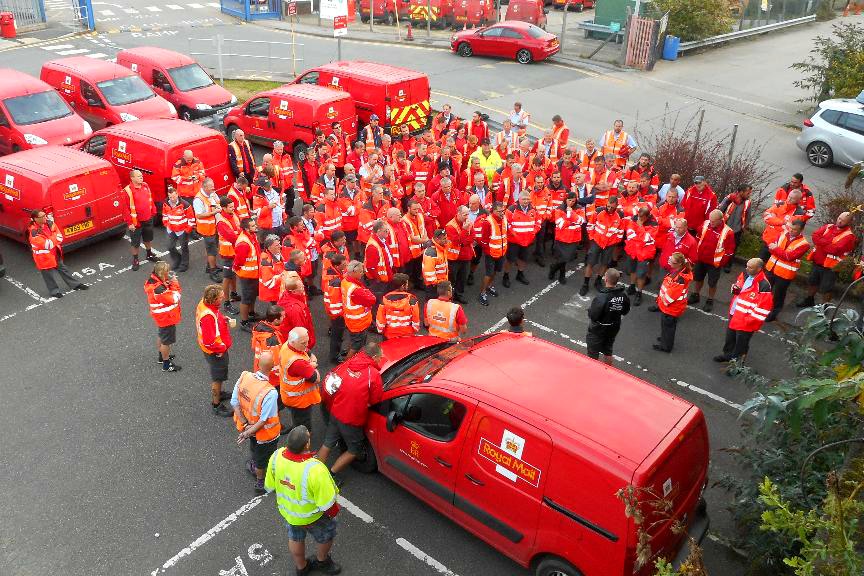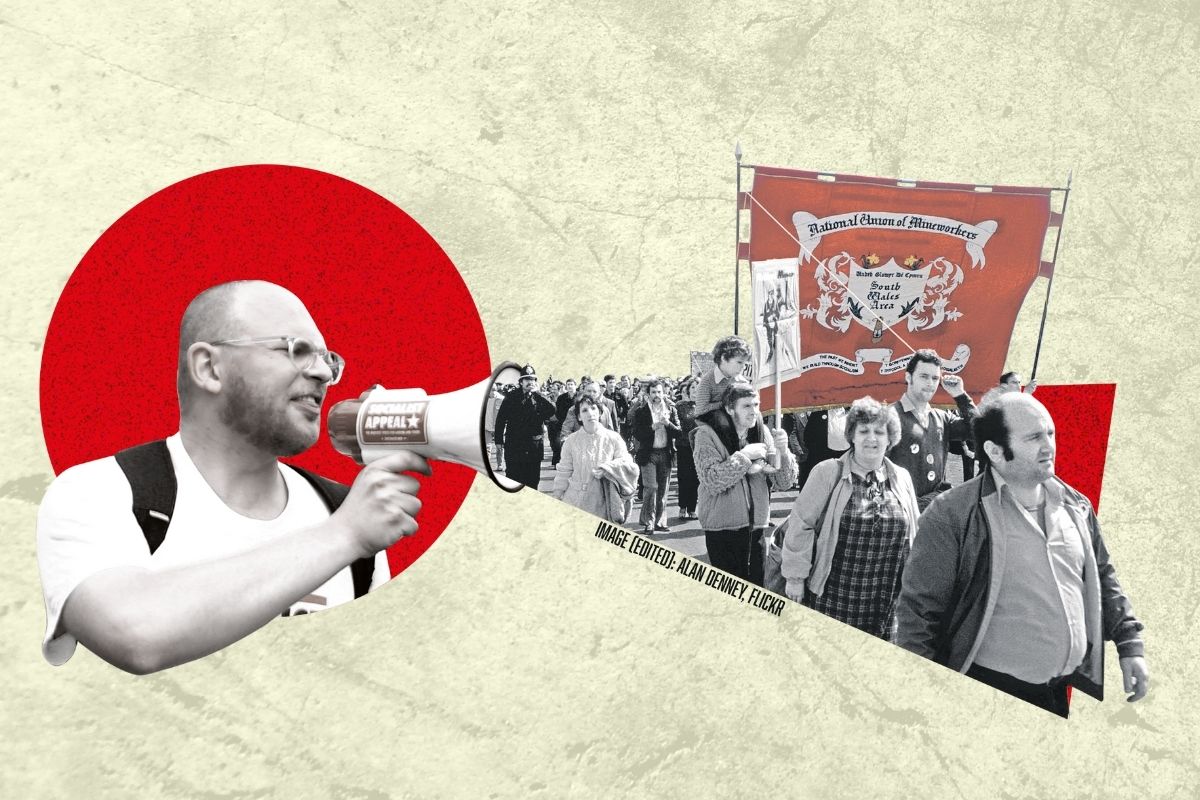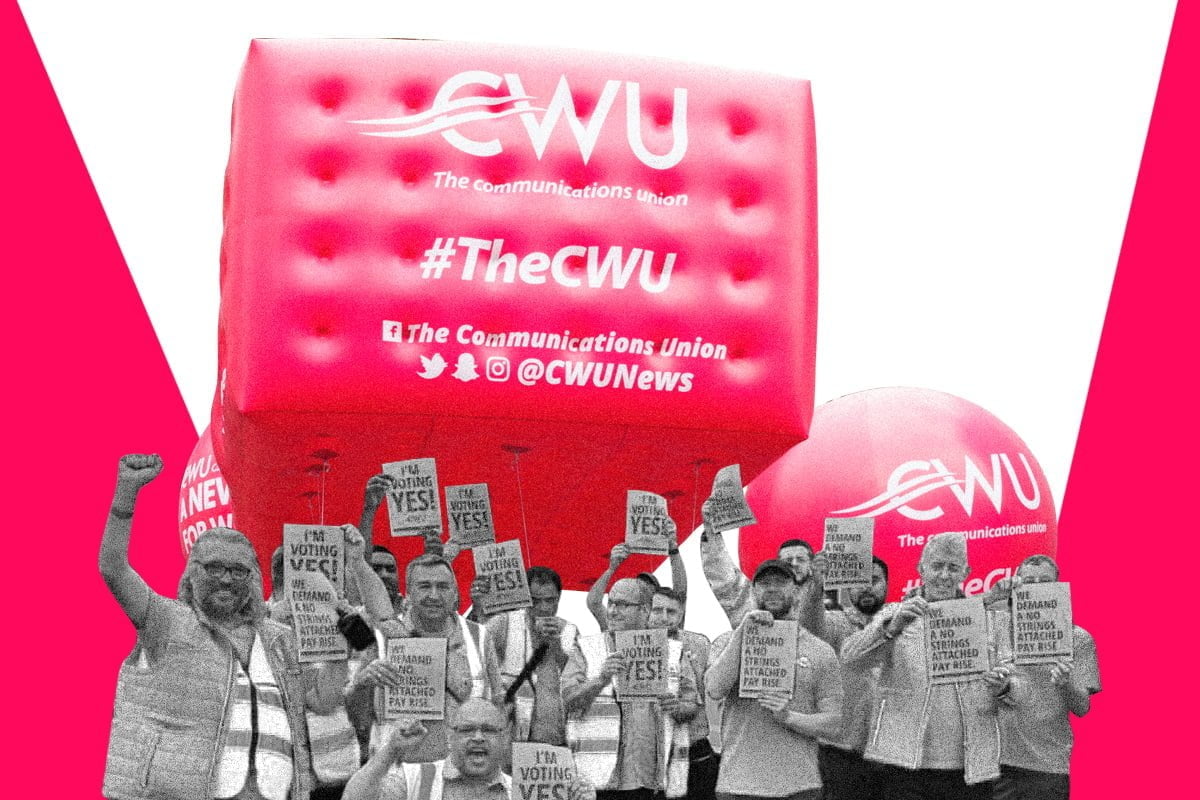With Royal Mail bosses digging their heels in, CWU members across the country will be walking out on six more dates in the run-up to Christmas. Socialist Appeal spoke to one striking postal worker on the real issues at stake in this struggle.
Walkouts by around 115,000 postal workers organised in the CWU are continuing this month, after the union turned down Royal Mail’s derisory 2% pay offer.
Royal Mail bosses have become increasingly belligerent, threatening further cuts to pay and conditions in an attempt to break the strikes by any means necessary. This includes intimidatory warnings that 10,000 jobs will have to be cut in order to make up for revenue lost due to ongoing strike action.
The bosses are intensifying their anti-worker rhetoric, and have thrown down the gauntlet. CWU members have picked it up, however, responding with multiple days of industrial action in the run-up to Christmas, the busiest time of the year.
Strike dates are currently planned for 9, 11, 14, 15, 23, and 24 December.
This is welcome news, showing the determination amongst postal workers to fight on.
In order to increase the chances of success, these strikes must be spread and escalated, with coordinated industrial action across the trade union movement to hit the bosses where it hurts.
Pay and conditions

Socialist Appeal interviewed Matt, a postal worker in Scarborough, about his views on the dispute.
“We are on strike firstly because we have been consistently offered a pay rise which equates to less than a cost-of-living adjustment,” Matt told us. “This means a real-term pay cut.”
While posties – and the whole of the working class – are rightly angry about below inflation pay, Matt states that “the real issue is terms, not wages”.
“We are facing a gutting of Royal Mail,” Matt explained, “turning us into a parcel courier service with only a three-day delivery of mail, including NHS letters and bank cards.”
This shift is fuelling a further casualisation of postal workers’ conditions. “[This means] later start times, so we often finish after 5pm; a weaker pension; no overtime; and mandatory seven-day working, with no days off.”
Logic of capitalism
This is the logical conclusion of privatisation. In 2013, 60% of Royal Mail was sold off to individual investors and financial institutions at fire sale prices. Meanwhile, the taxpayer picked up the company’s pension bill. In other words, the profits were privatised, and the losses remained nationalised.
In 2022, Royal Mail generated a record £758 million in profits – most of which ended up in the pockets of shareholders. This is a mouth-watering prospect for investors, who can skim off the cream, while the public picks up any unwanted costs.
Rumours have been circulating for a long time that billionaire Daniel Kretinsky, who currently controls 22% of Royal Mail’s parent company IDS, is looking to increase his stake and launch a full-blown takeover bid for the former public postal service.
Ultimately, whether Royal Mail is sold to Kretinsky, or any other super-rich fat-cat for that matter, the objective of the bosses is the same: to make the company appear as a juicy investment opportunity.
For this to happen, wages must be slashed, jobs must be cut, and workers must work longer and more gruelling shifts.
This aim is not lost on the postal workers. As Matt tells us: “There is a very real chance that Royal Mail will be turned into a parcel courier service and sold off in order to secure short-term financial gain.”
It is clear that the bosses have a lot riding on this dispute. They will do everything in their power to crush the union.
Coordinated action

“Mass action is the only power we have against the people who think they are in control of the company,” explained Matt. “The only way we can have any influence, as a union or as a workforce, is through united industrial action”.
“The only time the CEO has actually shown up to negotiations has been when a new series of strikes has been announced.”
The latest series of strikes leading up to Christmas are exactly what is required to answer the intransigence of the bosses.
Furthermore, with rail workers, nurses, and civil servants also striking this month, mass coordinated action between the unions is a real possibility.
This must be linked to political demands against austerity, and for the nationalisation of rail, mail, energy, and water under workers’ control.
There is no shortage of money to fund workers’ demands, as Matt points out:
“The strikes – even if we get everything we ask for – are a stopgap, not a solution. The top of the business will always squeeze the bottom to drive profits up. That’s shown in Royal Mail CEO Simon Thompson’s rhetoric about ‘losing £1 million a day due to strikes’.
“What he means is that they are making £1 million [a day] in profit, whereas during the lockdown they were making £2 million. They are still making profit, but because the margin has shrunk, they want to cripple and abuse the workforce to raise their bottom line.”
Militant conclusions

Workers like Matt are becoming increasingly militant. In the face of capitalism’s deepening crisis, they have no option other than to strike back.
At the same time, the mood amongst rank-and-file posties is hardening. “Some have given in and returned to work,” Matt informed us. “However, the vast majority have been made more resolute. They see that there is no other choice.”
The posties are leading the way. Coordinated action – including a mass campaign of rolling strikes, and a unified public sector walkout – would embolden the whole working class.
Mobilised and organised, such a movement could topple the Tories, and set the stage for a showdown between the bosses and workers.
More and more workers are coming to these conclusions themselves. “The bosses are punishing us for fighting for our own worth; for fighting back,” Matt says. “But they are losing.”






